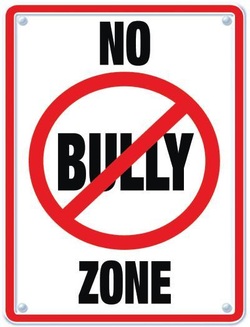 No Bully Zone. Bullying is a hug problem. I was bullied in school today. So and so is a big bully. None of these statements are helping to solve a problem. Thay are simply making a growing problem into a buzzword that annoys people and pacifies some into thinking they have an effective anti-bully campaign in place. After seeing the movie, Bully (http://www.thebullyproject.com/), I became so emotionally invested that I've felt the need to share my thoughts on this subject. I work with a population that because of their social challenges, are too often a victim of bullying, and this film spoke to that. It also spoke to the fact that there isn't enough information out there to prevent bullying, and that there are children that are dying because of the psychological effects of what some describe as "kids being kids". The following article outlines one local family's story and some of the responses from community partners to this evergrowing concern: http://www.saultstar.com/2013/04/03/everyone-needs-to-act-when-bullied-teens-are-in-trouble. My concerns and comments are threefold: 1. We can NOT stop bullying simply by telling bullies to stop. Creating a way for children to make themselves seem cool by rebelling is ineffective. 2. Wearing a pink shirt does not stop bullying. I have seen children wearing anti-bullying shirts while calling each other names. 3. You can't simply eliminate one behaviour without teaching an appropriate replacement behaviour. We need to teach children the social skills to avoid bullying and appropriately stand up for themselves, and we need to spread awareness about how to effectively create schools and communities where bullying is simply not cool.
0 Comments
Leave a Reply. |
AuthorCasey Burgess has a B.Sc.in Psychology, an M.A. in Education (Curriculum and Instruction), and a Ph.D. in progress in Education (Cognition and Learning). She has 20 years experience with direct service, curriculum development, workshop facilitation, and supervisory experience supporting children who have Autism Spectrum Disorders, and their families. She currently frames her work using a developmental, relationship-based, self-regulation lens. Archives
June 2021
Categories |
 RSS Feed
RSS Feed